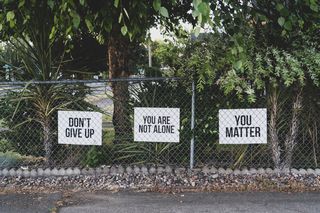Trauma
Trauma of Pandemic Proportions
Mental health consequences of the COVID-19 pandemic and tools for coping.
Posted March 14, 2020 Reviewed by Ekua Hagan

As the COVID-19 pandemic spreads across the globe, we are amidst a time of uncertainty and upheaval. Where the focus may often be on recognizing COVID-19 symptoms during this time, it is also important to recognize that this time of crisis and trauma may lead to mental health challenges for many. What are the mental health consequences of a pandemic and how do we cope when there is much that is out of our control?
First, it is important to acknowledge that a pandemic is considered a crisis, and in turn, can be traumatizing. Both for those who are directly exposed (e.g. those who become ill, have loved ones who become ill, lose jobs, etc.) or those who are indirectly exposed to the consequences of the pandemic (e.g. those witnessing their community in chaos), the upheaval of a widespread health crisis can be traumatic. To further explain, a situation that elicits psychological trauma “violates the familiar ideas and expectations about the world of an individual or society, plunging them into a state of extreme confusion and uncertainty” (Aydin, 2017). This definition similarly describes the results of a pandemic crisis.
Traumatic events can impair our ability to grasp or cope with what is happening, which can lead to a slew of challenges such as sadness, grief, pain, panic, confusion, despair, anxiety, depression, and more (Aydin, 2017). As Judith Herman (1992) states in her book about recovering from the aftermath trauma, “Traumatic events are extraordinary, not because they occur rarely, but rather because they overwhelm the ordinary human adaptations to life." In a time of trauma, our nervous systems can become overwhelmed in trying to process the experience which can lead to unexpected and undesired difficulties.
Not only can individuals experience trauma on their own, but entire groups of people and societies can collectively suffer from traumatic experiences. When trauma reaches a level where it negatively impacts entire societies or groups of people, it is called collective trauma. Situations that may lead to collective trauma include war, mass violence, genocide, and pandemics (Aydin, 2017).
As we consider how COVID-19 may affect our society, it is important that we not only consider how it may impact us medically but also what the societal mental health consequences the pandemic may have. With pandemics fitting the criterion for what may lead to collective trauma, it is a reminder that mental health difficulties may be widespread in response to the COVID-19 pandemic.
Previous pandemic research on influenza and the Ebola virus has provided us with some insight into how pandemics may affect the mental health of the general population. Some of the consequences noted in research have included increases in stress, distress, traumatic stress, and post-traumatic stress disorder (especially for medical professionals or those directly impacted by the pandemic), depression, feelings of hopelessness, anxiety, panic, and grief (Douglas et al., 2009; Kamara et al., 2017).
In recognizing how the COVID-19 pandemic can lead to individual and collective trauma, and the negative mental health effects people may face in response, it is important that we support ourselves and others throughout this time. Having a set plan for responding to mental health needs, just as one would have for protecting one's medical health, is important.

Some tips for taking care of your mental health during the COVID-19 pandemic may be:
- Stay connected with people. Even if the times necessitate quarantine or social distancing, get creative in ways to stay connected to others. Technology can be a great resource when physical proximity is not an option.
- When all else fails, remember the basics. Be sure to get enough sleep, eat well, and exercise. Research demonstrates that these basic daily tasks support our brains in coping effectively, regulating stress, decreasing depression and anxiety symptoms, and processing information.
- Just as you would create a medical toolkit, create a coping toolkit for yourself. Put together a list or kit of activities and objects that help you feel grounded, safe, bring you joy, and increase your quality of life as you ride out this crisis.
- Although staying informed is important, as possible, minimize your exposure to media on the outbreak and/or the flooding of traumatic stories about the pandemic. Exposure to trauma-filled media has been linked with increases in vicarious traumatization and traumatic stress symptoms. (For more on this, see my article, Watching the News Can be Traumatizing.)
- Even if you cannot get mental health services in person, there are many ways in which you can obtain distance mental health services. Multiple providers offer online counseling services or 24/7 crisis lines (SAMSHA National Helpline).
- If all else fails, normalize your struggles. Remember that you are not alone in this and many others are dealing with the consequences of this distressing time. Be kind to yourself (and others). Kindness and compassion can go a long way.
For more information on how to support your mental health needs during this time, see APA Pandemic Resources.
Copyright 2020 Danielle Render Turmaud, MS, NCC. All Rights Reserved. No part of this article may be reproduced without the permission of the author.
References
Aydin, C. (2017). How to Forget the Unforgettable? On Collective Trauma, Cultural Identity, and Mnemotechnologies, Identity, 17:3, 125-137, DOI: 10.1080/15283488.2017.1340160
Douglas, Pamela K, Douglas, David B, Harrigan, Daniel C, & Douglas, Kathleen M. (2009). Preparing for pandemic influenza and its aftermath: mental health issues considered. International Journal of Emergency Mental Health, 11(3), 137–144. Retrieved from http://search.proquest.com/docview/733546071/
Grennan, D. (2019). What Is a Pandemic? JAMA, 321(9), 910. https://doi.org/10.1001/jama.2019.0700
Herman, J. (1992). Trauma and recovery: The aftermath of violence from domestic abuse to political terror. New York, NY: Basic Books.
Kamara, S., Walder, A., Duncan, J., Kabbedijk, A., Hughes, P., & Muana, A. (2017). Mental health care during the Ebola virus disease outbreak in Sierra Leone. Bulletin of the World Health Organization, 95(12), 842–847. https://doi.org/10.2471/BLT.16.190470
McAlonan GM, Lee AM, Cheung V, Wong JW, Chua SE. Psychological morbidity related to the SARS outbreak in Hong Kong. Psychological Medicine 35(3):459-60 (March 2005).


